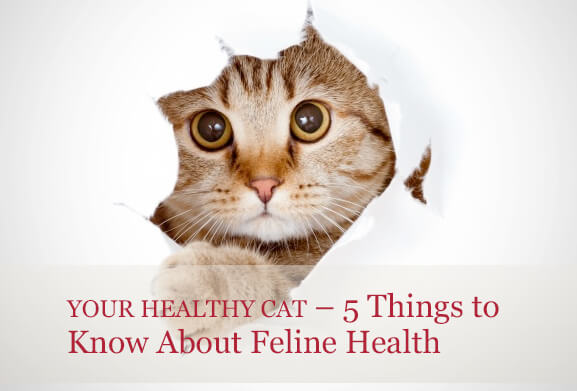We have all heard the maxim that cats have nine lives. Cat lovers understand where that comes from– they know their pets are survivors that can very capably master their environments.
But your feline companion has only one life (not nine). At the Centre Street Animal Hospital, we are committed to ensuring that the life you share with your cat is rewarding, healthy and long.
Keeping your cat in feline health is important. Bringing your cat into the clinic for regular check-ups is the starting point, but there are a number of things that you, as a cat lover and owner, can do to keep your cat healthy and happy.
1. Know Your Cat’s Age or Developmental Stage
Knowing your cat’s age is tricky. We sometimes say that every human year is seven years for cats, but it is more complicated than that. It is more helpful to look at your cat’s life in terms of life stages.
- Kitten
- Adolescent
- Adult
- Senior
For every stage, learn what your cat needs and what you should be looking for to assess its overall health.
In the kitten stage, your cat needs immunization, parasite testing and socialization.
In the adolescent years, pay attention to things like changes in appetite, levels of energy, cleanliness of the ears, as well as things such as excessive thirst.
In the adult years, your cat will being slowing down, and our health priorities will turn to preventative treatments.
As your cat enters the senior years, pay close attention to levels of activity, appetite, changes in weight and litter box habits, as cats can develop diabetes, arthritis, thyroid disease and other problems. These diseases often creep up dramatically after being very subtle in their progression over long periods. It is of the utmost importance to ensure that your cat has a professional medical exam at least annually even if they are indoors and you choose a reduced vaccine regimen.
By paying close attention, you can identify early the problems and help us give your cat the proper treatment.
2. Keep Your Cat’s Coat Clean
Keeping your cat’s coat neat and clean is a step in the right direction.
Cats shed all year round, but there are a couple times during the year when seasonally they shed a lot. Don’t worry – shedding is healthy.
You can use a flea comb to maintain their coat. A flea comb helps gets fleas off your animal and it removes a lot of the dead hair. If you have a long-haired cat, the flea comb will also remove some of the mats that form in the coat.
Be careful – the flea comb’s teeth are stiff and it may brush a little close to the skin.
Also, never use a pair of scissors to cut their fur or remove mats, as accidents of cutting their skin frequently occur this way.
3. Pay Attention to their Dental Health
We recently acknowledged February as Dental Health Month by publishing some blog posts and newsletter articles on the importance of dental health.
We emphasized the importance of monitoring your pet’s dental health, including getting regular check-ups as well as doing your own inspections.
When looking in your cat’s mouth, be alert to certain items of concern.
- Brown or yellow discoloration of teeth
- Loss of teeth
- Reddened, painful gums
- Excessive salvation
Indeed, your cat’s dental health is essential part of their overall health. Food particles that accumulate in your pet’s mouth can harden into tartar, and the bacteria can make its way into the cat’s system. Cats frequently get an oral condition of their teeth called resorptive lesions that are very painful, and closely mimic a severe cavity that is directly open to the nerve in people. Pets are notorious for not being overtly demonstrative of pain, so don’t be fooled by their acting ‘normal’.
4. Keep their Nails Trimmed
If your pet is an indoor cat, you can help minimize scratching by keeping their nails trimmed. For the most part, cats are cooperative about having their nails clipped.
Remember: cats usually keep their nails inside the paw, so the trick is to extend the nail so you can clip it. Hold the cat’s paw in your hand and extend it gently but firmly.
The pink area at the centre of the nail is called the “quick.” It’s a blood vessel. Be careful not to cut it or it will bleed and will almost certainly alarm your cat.
Scratch posts can also be very useful in providing an outlet for their need to scratch on something. This may reduce frustration for them as well as save damage to your furniture and carpets (and of course body parts).
5. Keep the Flea and Tick Treatment Up-to-Date
Fleas and ticks can lead to Anemia, Tapeworm, blood parasitic and other diseases. The key is prevention and making sure your cats remain safe from fleas and ticks.
- Using products such as Revolution, Advantage, or Frontline (not available in Canada)
- Providing a clean environment for you pet
- Ensuring your backyard is clear of fleas and ticks
- Taking your pet for regular veterinary checkups and visits
Feline Health
Staying on top of your cat’s long-term health is a matter of staying informed and practicing prevention. An annual check-up is essential so we can work together to ensure long-lasting feline health for your cat.
Remember – we are in this together. The staff of the Centre Street Animal Hospital are here for you and your cat to make sure you have a long and healthy life together.
You can always contact us with questions or to examine your pets.

